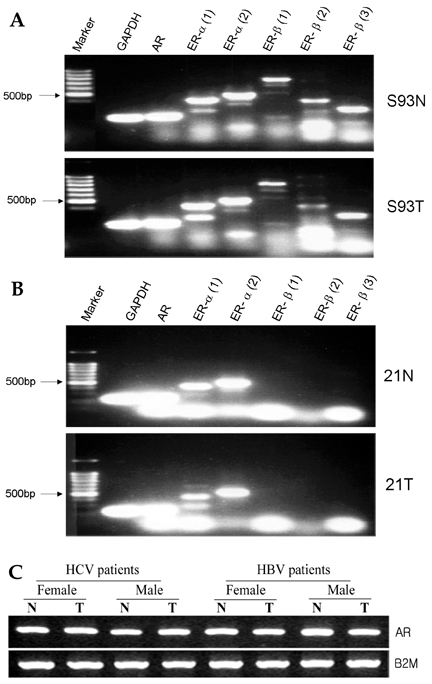Yonsei Med J.
2006 Dec;47(6):811-816. 10.3349/ymj.2006.47.6.811.
The Expression of Estrogen Receptors in Hepatocellular Carcinoma in Korean Patients
- Affiliations
-
- 1KRIBB, Daejeon, Korea. dslee@kangwon.ac.kr
- 2Yonsei University, Seoul, Korea.
- 3Yeungnam University, Daegu, Korea.
- 4The Catholic University of Korea, Seoul, Korea.
- 5Korea Institute of Radiol and Med Sci, Seoul, Korea.
- 6Ajou University, Suwon, Korea.
- 7Chungnam National University, Daejeon, Korea.
- 8SUN General Hosp., Daejeon, Korea.
- 9Kangwon National University, Chunchon, Korea.
- KMID: 1777170
- DOI: http://doi.org/10.3349/ymj.2006.47.6.811
Abstract
- Expression of estrogen receptors (ER)-alpha and -beta, as well as androgen receptor (AR), in hepatocellular carcinoma (HCC) is thought to be correlated with prognosis, survival, and male prevalence of HCC. These hypotheses are based on investigations of European patients; however the expression patterns of these receptors in Asian patients are largely unknown. In this study, we collected liver carcinoma and peritumor tissues from 32 patients (9 females and 23 males) in South Korea. The expression of ERs and ARs was studied using RT-PCR. Wild-type ER-alpha and AR were expressed in all of the samples investigated, and their expression was independent of the causal virus or patient sex. Expression of the ER-alpha variant was independent of sex (100% female vs. 91.3% male) and HCV and HBV status (91.3% vs. 100%). Wild-type ER-beta was expressed more often in HCV patients than in HBV patients (95.7% vs. 44.4%; p < 0.05). In conclusion, the stronger ER-alpha variant expression in HCC tissues implies that this variant has an important role in HCC development. However, at least in Korean patients, expression of the ER-alpha variant (vER-alpha) is not related to male HCC prevalence. In addition, the predominant expression of ER-beta in HCV patients suggests that it plays an important role in HCV-induced liver disease.
Keyword
MeSH Terms
-
Sex Factors
Receptors, Estrogen/*metabolism
Receptors, Androgen/metabolism
Middle Aged
Male
Liver Neoplasms/ethnology/*metabolism/virology
Korea
Humans
Hepatitis B virus/isolation & purification
Hepacivirus/isolation & purification
Female
Carcinoma, Hepatocellular/ethnology/*metabolism/virology
Biological Markers/metabolism
Asian Continental Ancestry Group
Aged
Figure
Reference
-
1. Yang WI, Choi IJ, Kim HO, Lee KS. Demonstration of estrogen receptor by immunohistochemical staining in paraffin sections of breast carcinoma. Yonsei Med J. 1991. 32:117–125.2. Eagon PK, Porter LE, Francavilla A, DiLeo A, Van Thiel DH. Estrogen and androgen receptors in liver: their role in liver disease and regeneration. Semin Liver Dis. 1985. 5:59–69.3. Johnson PJ. Sex hormones and the liver. Clin Sci (Lond). 1984. 66:369–376.4. Nagasue N, Ito A, Yukaya H, Ogawa Y. Androgen receptors in hepatocellular carcinoma and surrounding parenchyma. Gastroenterology. 1985. 89:643–647.5. Roy AK, Milin BS, McMinn DM. Androgen receptor in rat liver: hormonal and developmental regulation of the cytoplasmic receptor and its correlation with the androgen-dependent synthesis of alpha2u-globulin. Biochim Biophys Acta. 1974. 354:213–232.6. Sato N, Ota M, Obara K. Presence of binding component(s) for testosterone in rat liver cytosol. Endocrinol Jpn. 1980. 27:315–319.7. Porter LE, Elm MS, Van Thiel DH, Dugas MC, Eagon PK. Characterization and quantitation of human hepatic estrogen receptor. Gastroenterology. 1983. 84:704–712.8. Rossini GP, Baldini GM, Villa E, Manenti F. Characterization of estrogen receptor from human liver. Gastroenterology. 1989. 96:1102–1109.9. De Maria N, Manno M, Villa E. Sex hormones and liver cancer. Mol Cell Endocrinol. 2002. 193:59–63.10. Johnson FL, Lerner KG, Siegel M, Feagler JR, Majerus PW, Hartmann JR, et al. Association of androgenic-anabolic steroid therapy with development of hepatocellular carcinoma. Lancet. 1972. 2:1273–1276.11. Ohnishi S, Murakami T, Moriyama T, Mitamura K, Imawari M. Androgen and estrogen receptors in hepatocellular carcinoma and in the surrounding noncancerous liver tissue. Hepatology. 1986. 6:440–443.12. Nagasue N, Yukaya H, Chang YC, Ogawa Y, Kohno H, Ito A. Active uptake of testosterone by androgen receptors of hepatocellular carcinoma in humans. Cancer. 1986. 57:2162–2167.13. Yu MW, Chen CJ. Elevated serum testosterone levels and risk of hepatocellular carcinoma. Cancer Res. 1993. 53:790–794.14. Nagasue N, Yu L, Yukaya H, Kohno H, Nakamura T. Androgen and oestrogen receptors in hepatocellular carcinoma and surrounding liver parenchyma: impact on intrahepatic recurrence after hepatic resection. Br J Surg. 1995. 82:542–547.15. Villa E, Camellini L, Dugani A, Zucchi F, Grottola A, Merighi A, et al. Variant estrogen receptor messenger RNA species detected in human primary hepatocellular carcinoma. Cancer Res. 1995. 55:498–500.16. Iavarone M, Lampertico P, Seletti C, Francesca Donato M, Ronchi G, del Ninno E, et al. The clinical and pathogenetic significance of estrogen receptor-beta expression in chronic liver diseases and liver carcinoma. Cancer. 2003. 98:529–534.17. Ahn SH, Han KH, Park JY, Youn YH, Moon CM, Lee KS, et al. Treatment outcome of transcatheter arterial chemoinfusion according to anticancer agents and prognostic factors in patients with advanced hepatocellular carcinoma (TNM stage IVa). Yonsei Med J. 2004. 45:847–858.18. Fuqua SA, Fitzgerald SD, Chamness GC, Tandon AK, McDonnell DP, Nawaz Z, et al. Variant human breast tumor estrogen receptor with constitutive transcriptional activity. Cancer Res. 1991. 51:105–109.19. Vladusic EA, Hornby AE, Guerra-Vladusic FK, Lupu R. Expression of estrogen receptor beta messenger RNA variant in breast cancer. Cancer Res. 1998. 58:210–214.20. Grimaldi C, Bleiberg H, Gay F, Messner M, Rougier P, Kok TC, et al. Evaluation of antiandrogen therapy in unresectable hepatocellular carcinoma: results of a European Organization for Research and Treatment of Cancer multicentric double-blind trial. J Clin Oncol. 1998. 16:411–417.
- Full Text Links
- Actions
-
Cited
- CITED
-
- Close
- Share
- Similar articles
-
- Immunohistochemical studies on the rate of positive reaction of estrogen receptors and progesterone receptors in the breast diseases
- Expression of p53 Protein in Endometrial Carcinoma
- Sebaceous carcinoma of the eyelids: frequent expression of c-erbB-2 oncoprotein
- Expression of the pS2 Protein and Its Relation with Estrogen and Progesterone Receptor in Breast Cancer
- Estrogen and Progesterone receptors in Meningioma



